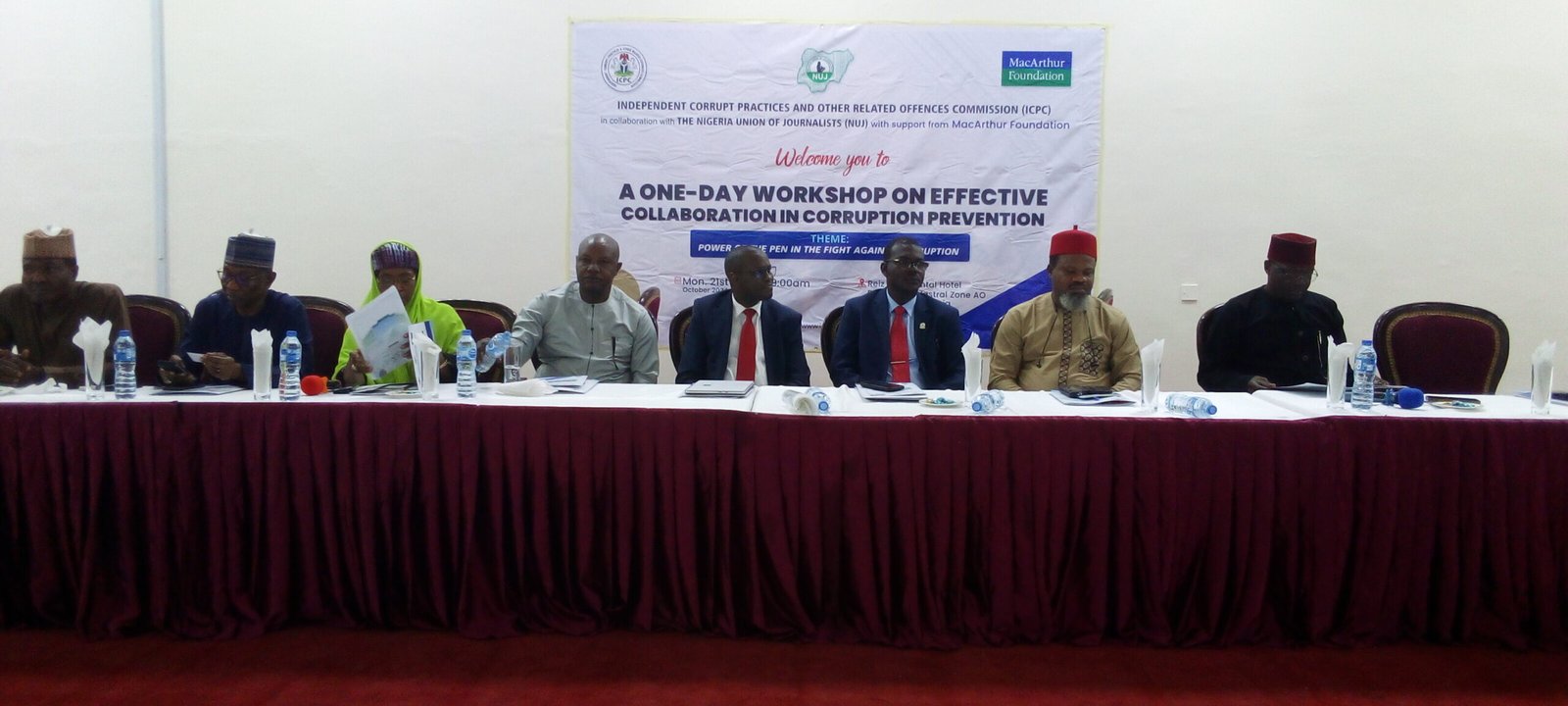The Chairman of the Independent Corrupt Practices and Other Related Offences Commission (ICPC), Dr. Musa Adamu Aliyu, SAN, on Monday canvassed more for support of the media in the fight against corruption.
The ICPC chairman who made the call in his welcome address at a One-Day Workshop on Effective Collaboration in Corruption Prevention with the Nigerian Union of Journalists (NUJ) Organized by the anti-graft Commission in Abuja on Monday, noted the role of the media in winning the war against corruption.
Aliyu called on the media to intensify its efforts in supporting the fight against corruption in Nigeria stressing the essential role that the media plays in promoting transparency and holding individuals and institutions accountable.
He identified the media as a critical stakeholder in the information and public relations and urged for shared goal in combating corruption for the benefit of our nation.
Speaking in the same breath at the One-Day Round Table Engagement the President of the Nigeria Union of Journalists (NUJ) Comrade Chris Isiguzo called for the safety and security of journalists to be prioritised as they continue their crucial work in exposing corruption across the country.
The Theme of the workshop is, ” Power of the Pen in the Fight against Corruption”.
Explaining why the workshop was focused on building the capacity of journalists to report on corruption and governance issues Aliyu said that it could not have come at a better time than no, adding that the media is a crucial partner in exposing corrupt practices and creating public awareness about the detrimental effects of corruption.
The chairman said, “Without the work of investigative journalists and robust reporting, much of the corruption we see today would remain hidden from the public eye.”
He also urged journalists to continue digging deep into corruption cases, but also to ensure accuracy, fairness, and professionalism in their reporting.
His words, “The ICPC is committed to supporting the media in this fight, and we encourage collaboration that will allow for the accurate dissemination of information that helps the public understand the scale and impact of corruption in Nigeria”.
Aliyu therefore called for continuous dialogue and partnership between anti-corruption agencies like the ICPC and the media, stressing that a well-informed and proactive press is essential for winning the battle against corruption in Nigeria.
In his speech, the NUJ President called for the safety and security of journalists to be prioritised as they continue their crucial work in exposing corruption across the country.
Isiguzo emphasised that without adequate protection, journalists remain vulnerable to threats, harassment, and violence, which undermines their ability to carry out their duties effectively.
According to Isiguzo, “Journalists play an essential role in the fight against corruption, and it is imperative that their safety and security be treated as a top priority,” Isiguzo remarked, adding: “If we are to continue this essential work of exposing corruption and holding public officials accountable, journalists must be able to operate in a safe environment, free from intimidation and harm.”
He highlighted the numerous cases of attacks on journalists in Nigeria, especially those involved in investigative reporting on corruption, emphasising the urgent need for government and security agencies to take stronger measures to protect the press.
He called on both state and non-state actors to respect press freedom, stressing that a free and protected press is crucial for democracy and good governance.
The NUJ President urged media organisations to provide necessary training for their staff to handle the risks associated with investigative journalism.
He also advocated for better laws and policies that protect journalists from legal harassment and ensure their safety while carrying out their duties.
He reiterated the NUJ’s commitment to supporting journalists in their work and collaborating with international organisations and stakeholders to ensure that journalists in Nigeria can operate without fear, while continuing to serve as a vital force in the fight against corruption.
The workshop, which brought together journalists from various media outlets, provided training on how to report corruption effectively and how to protect themselves against potential risks associated with covering sensitive stories.
In his own remarks the Country Director of the MacArthur Foundation, one of the sponsors of the workshop, called on the media to not only expose corruption, but also highlight positive stories and individuals driving change in Nigeria’s fight against corruption.
Shettima listed the dual responsibility of the media as holding corrupt individuals accountable and promoting stories of integrity and transformation.
He emphasised that while investigative journalism remains a powerful tool in uncovering corrupt practices, the media must also celebrate those working tirelessly to foster transparency and accountability.
“The media plays an instrumental role in shaping perceptions and narratives. It is crucial to expose corruption, but it is equally important to promote individuals and institutions that are making positive contributions to the country’s development”, the MacArthur Foundation, Country director said.




Blue Techker Pretty! This has been a really wonderful post. Many thanks for providing these details.